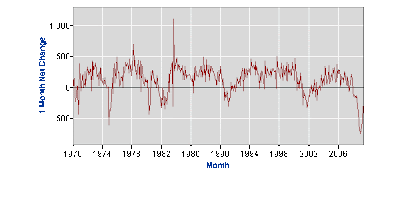A comparison of nominal GDP (i.e. in current dollars, not adjusted for inflation) and household debt clearly shows a rapidly rising debt burden for America's families. The ratio of such debt to GDP has been rising for a long time; the chart below is familiar to most of us and has been displayed in this blog several times. Notice the leap from 65% to near 100% beginning in 2000.
 Household Debt As A Percentage of GDP (Data: St. Louis Fed)
Household Debt As A Percentage of GDP (Data: St. Louis Fed)We can further analyze the annual growth rates of the two elements of the ratio, i.e. nominal GDP and household debt, to produce the chart below. We can immediately identify two time periods during which debt grew much faster than GDP: 1984-1987 and 2000-2007 (grey boxes).


Annual Growth Rates In GDP and Household Debt
There are two major differences between the two periods:
Looking forward, what can we say about the prospects for a rebound? First of all, it is obvious that this downturn is completely different from every other post-WWII recession. Its causes are so entirely different (e.g. they have little to do with excess inventory build-ups) as to make comparisons and predictions based on past cycle analysis misleading, if not worthless.
From this follows that the current focus on bailing out the financial industry is akin to sheltering the flu virus instead of containing and eradicating it. It means that Mr. Obama is either (a) mostly ignorant of (somewhat sophisticated) economics and has thus allowed Messrs. Bernanke, Geithner, Summers and their Wall Street brethren to bamboozle and/or scare the daylights out of him or, (b) is completely in bed with them. From my sizing up of the man I opt for (a) in combination with a realistic assessment of Democratic Party internal power plays (e.g. Mrs. Clinton at State).
Therefore, I come up with both an explanation for what has been happening thus far in financial markets (don't worry boys, the guy is essentially clueless and can't/won't stand up against us) and a prediction of the future (the mutated virus will come back with a vengeance).
What should Mr. Obama be doing instead of listening to the Wall Street harpies? Immediately shift focus to the real economy, where real jobs and earned incomes are generated, preferably by overhauling the energy and transportation infrastructure of the United States. There are millions of highly skilled jobs waiting to be created right there, not to mention the tremendous added benefits of shifting away from petroleum (slashing the defence budget, geopolitical gains, environmental and health improvements).
___________________________________________________________
Addendum: August 31, 2009
A reader asked for a longer chart of the Household Debt/GDP ratio. I don't have one, but I can provide a Total Debt/GDP chart going back 100 years.

There are two major differences between the two periods:
- The most recent period lasted twice as long as the first one and ultimately resulted in the onerous debt burden of 100% of GDP for American families.
- During 2000-07 conventional mortgage rates were less than half than those that prevailed in the 1980's (more so when we consider the recent popularity of adjustable-rate mortgages which peg off much lower short-term rates).
Looking forward, what can we say about the prospects for a rebound? First of all, it is obvious that this downturn is completely different from every other post-WWII recession. Its causes are so entirely different (e.g. they have little to do with excess inventory build-ups) as to make comparisons and predictions based on past cycle analysis misleading, if not worthless.
From this follows that the current focus on bailing out the financial industry is akin to sheltering the flu virus instead of containing and eradicating it. It means that Mr. Obama is either (a) mostly ignorant of (somewhat sophisticated) economics and has thus allowed Messrs. Bernanke, Geithner, Summers and their Wall Street brethren to bamboozle and/or scare the daylights out of him or, (b) is completely in bed with them. From my sizing up of the man I opt for (a) in combination with a realistic assessment of Democratic Party internal power plays (e.g. Mrs. Clinton at State).
Therefore, I come up with both an explanation for what has been happening thus far in financial markets (don't worry boys, the guy is essentially clueless and can't/won't stand up against us) and a prediction of the future (the mutated virus will come back with a vengeance).
What should Mr. Obama be doing instead of listening to the Wall Street harpies? Immediately shift focus to the real economy, where real jobs and earned incomes are generated, preferably by overhauling the energy and transportation infrastructure of the United States. There are millions of highly skilled jobs waiting to be created right there, not to mention the tremendous added benefits of shifting away from petroleum (slashing the defence budget, geopolitical gains, environmental and health improvements).
___________________________________________________________
Addendum: August 31, 2009
A reader asked for a longer chart of the Household Debt/GDP ratio. I don't have one, but I can provide a Total Debt/GDP chart going back 100 years.










